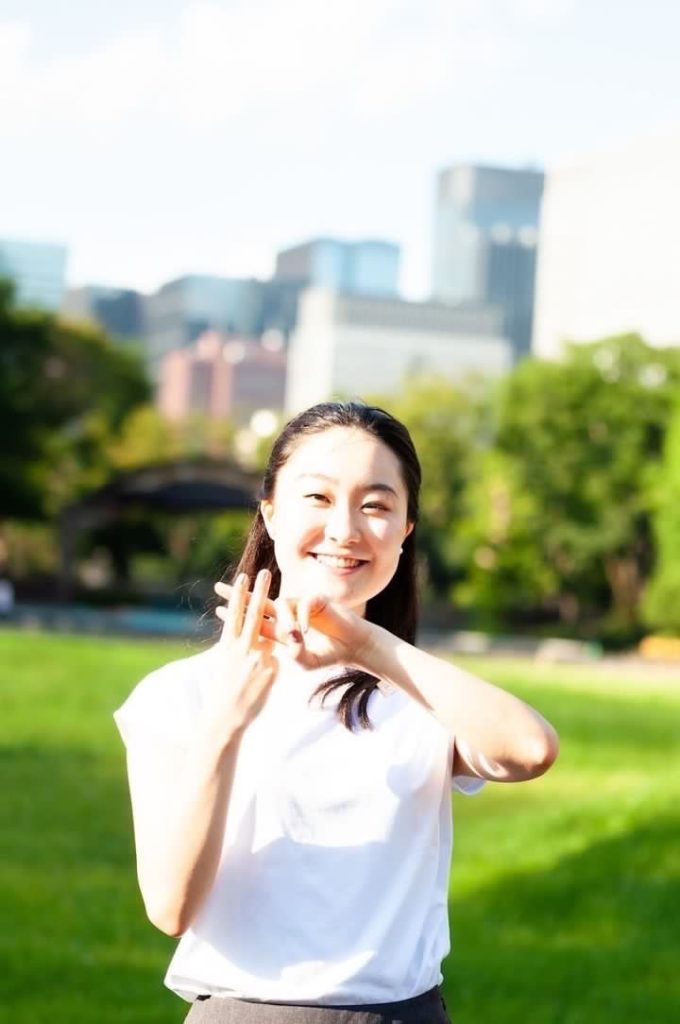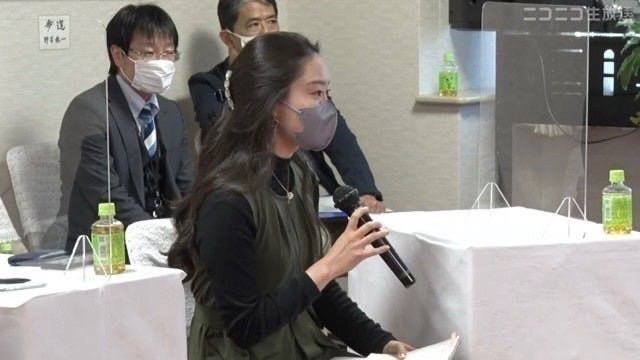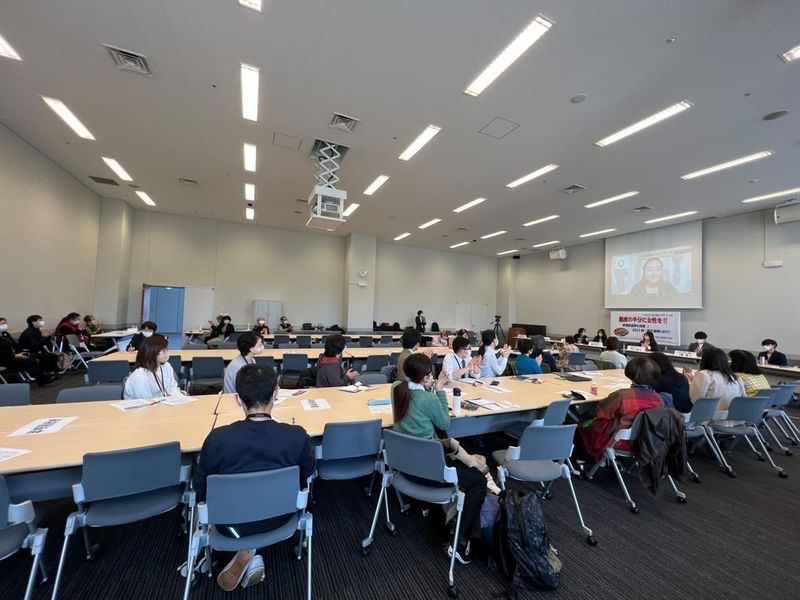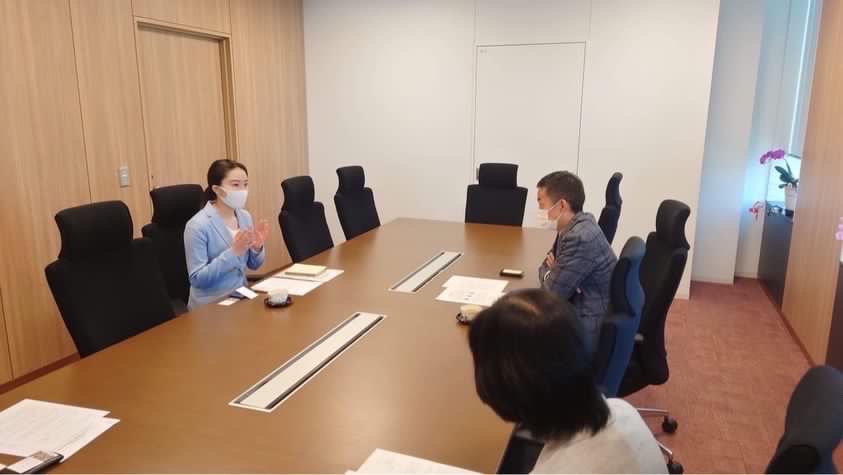Empowerment of “Women” for a World that leaves no one behind – An Interview with Riyuka Suzuki!
For ICONfront’s 31st interview, we interviewed Riyuka Suzuki, who aims to bring social equity through two activities: “#Minna no Seiri (#Everyone’s Periods)” and the installation of the gender quota system. Throughout our interview, we recognized how these two pursuits are integral to shaping her core beliefs.
Please read the article to find out more!

Q1. What do you do in your activities?
There are two projects I am part of.
The first is an advocacy campaign at #みんなの生理 (MI-NN-NA NO SEI-RI, Everyone’s Period), which aims to create the infrastructure for everyone to have a safe period, and it started around the summer of 2020; the second is an online petition to promote the introduction of a legal-type gender quota system in the political sphere, and this social movement started it in February 2022
Advocacy campaign in # Everyone’s Period:
We are working from three perspectives to create an infrastructure for a safe menstrual period.
①Access to feminine hygiene products
We are lobbying local governments by submitting requests to achieve the free distribution and installation of feminine hygiene products. We also utilize donations from supporters of our activities and send feminine hygiene products. We would like to promote the distribution and installation of these sanitary products in public facilities nationally, but the difficulty lies in the fact that whether or not we can achieve this depends greatly on the understanding of those in charge of schools and local governments.
②Access to information on periods
To spread the correct knowledge on periods, we share information on social media and deliver lectures to public and private sectors.
③Dispelling the stigma of periods
In a context where talking about periods tends to be considered taboo, although the stigma of periods is lessened, we have used online cafes to create a space where people can talk about periods. As for the ground rules here, we try to avoid identifying the speaker, displaying offensive attitudes to different opinions, generalizing complex matters, and assuming that all women have periods or they are women because they experience periods.
#Everyone’s Periods has an ongoing online petition.
- 「キャンペーン · 生理用品を軽減税率対象にしてください!」(Decrease tax rates for feminine hygiene products)
- 「学校のトイレに生理用品を設置してください!」 (Please install feminine hygiene products in school bathrooms!)
Social movements aimed at installing quota system:
There are two main activities.
①Online petition to promote the installation of quota system*
*Quota system in the field of politics is a system of allocating a certain percentage of parliamentary seats to women or both sexes on the basis of gender, with the aim of reducing gender disparities in the legislature. There are three types of quotas: the first is a system in which a certain number of parliamentary seats are allocated to women; the second is a system in which a certain percentage of candidates are allocated to women; and the third is a system in which political parties allocate a certain percentage of parliamentary candidates to women.
②Exchanging opinions with decision-makers and speeches in meetings at the official buildings of the House of Representatives
- Participate in meetings to exchange opinions with decision-makers such as Liberal Democratic Party (LDP) Secretary General Mogi.
- have a speech as a representative of youth at a national assembly in the meeting of the Association to Promote the Quota System (called Q-NO-KAI)
There is an ongoing online petition for this project as well.
「日本の政治にジェンダー平等を!法律型のジェンダー・クオータ制を導入してください!」 (Bring in Gender Equality in Japanese Politics! Please legislate the gender quota system!)

Q2. Why did you start these activities?
Advocacy campaign in # Everyone’s Period:
I first became interested in issues related to periods when I was on a one-year exchange program in high school. I was intrigued by the difference in perception of periods between me and my local friend. My friend did not hesitate to say in front of the class, “I’m going to miss swimming class because I’m on my period,” but I skipped swimming class by saying that I had a stomach ache. Although this was also true, periods should not be a phenomenon that should be ashamed of, but reflecting on the fact that I felt ashamed due to the way society was structured, I began to question the particular “shame” that I had been experiencing. After returning to Japan, I was surprised and discomforted that feminine hygiene products were exempted from the reduced tax rate products, even though they are necessities. But the overwhelming majority of people around me were of the opinion that it was inevitable. After entering university, I found and joined a signature campaign related to period-related issues.
My motivation for joining # Everyone’s Periods was to give back the resources I possessed and to “bridge” the gap between the political arena and the organization’s activities. This is because I had experience talking to legislators about periods through my internship and had a connection with them. I also strongly identified with the petition campaign “Please make feminine hygiene products subject to the reduced tax rate!” (see ICONfront’s interview with Ms. Taniguchi), which was one of the main reasons why I decided to join the campaign.
Social movements aimed at installing quota system:
I launched a signature campaign late at night on the day I gave a presentation as part of a lecture called Introduction to Political Science at ICU. In this class, Professor Kibe covered Kentaro Maeda’s book “JYO-SEI-NO-INAI-MINSHU-SHUGI (Democracy without Women)” as part of the class curriculum. Through this lecture and preparing a presentation on Dr. Maeda’s book, I realized that appropriate measures were needed to make visible the invisible voices in society. When I was confident that I could theoretically persuade the importance of the quota system, I decided to launch a signature campaign. When I started, I was mainly involved in online activities such as signing signatures, but it was my involvement in the political world that I gained through my work with #Eveyone’s Period that gave me the opportunity to participate in face-to-face events and other activities afterward.
Q3. How did you feel when you started those activities?
Advocacy campaign in #Minna no Seiri:
When I first started participating in the activities, I was excited. But at the same time, there were (are) many dilemmas in the course of the activities.
The first dilemma was that in 2020, when I started my activities, the stigma regarding periods was stronger than it is today, and it was difficult to get people around me to support me when I talked about things like achieving the free distribution of feminine hygiene products. As is often the case with activists, I believed in what I thought was right, and by continuing to communicate it, the social movement I was engaged in with conviction (in my case, the movement regarding periods and the quota system) had become part of my identity, for better or worse. Consequently, when I received negative comments about my activities, I felt as if my identity was being denied, and I was sometimes hurt.
The second conflict is that the term “SEIRI-NO-HINKON (period poverty)” itself is a kind of “power word” that may be effective in promoting social issues, but it has the function of simplifying a complex situation. The term “poverty” often refers to financial aspects, but in reality, there are many other things to consider, such as difficulties in accessing feminine hygiene products and knowledge about menstruation. For example, there are few opportunities to gain knowledge, difficulty in purchasing sanitary products for single-father households, and even in some cases, access to feminine hygiene products is not available due to a lack of permission from the breadwinner of the household. There is also a concern that the use of the term “women” may result in the existence of people who are not women by gender identity but who experience periods, for example, being left out of the framework.
Social movements aimed at installing quota system:
In this activity, rather than anxiety or excitement, there was a strong sense of dissatisfaction and anger toward the homogeneous decision-makers and their decision-making process in which no one party is involved. Decision makers in politics are supposed to be a microcosm of the citizens, so I thought it was strange that they tended to be made up of members with similar attributes (e.g., highly educated, male, middle-aged, with a female partner).
Q4. What do you find rewarding in your activities?
#Advocacy campaign in #Minna no Seiri:
I find it rewarding to some extent when the government and municipalities react to our steady efforts, like when information on period poverty got written in the Basic Act for Gender Equal Society. As I mentioned earlier, the definition of period poverty in this act does not cover a wide range of people who may be affected by period poverty. Nevertheless, it was a major step forward that the information is in the act.
I also find it rewarding when I hear news about surveys of period poverty being conducted by the Ministry of Health, Labour and Welfare, or feminine hygiene products installed in schools with our successful efforts in lobbying. Even though the things that schools and municipalities can do largely depend on ideology and understanding of the principals, there was also a time when a survey on menstruation was conducted across all public schools in a particular municipality.
Social movements aimed at installing quota system:
I feel deeply relieved to have continued this activity when I am freed from loneliness thanks to the encounters with other activists at where I go.
Unfortunately, a gender quota system gets exposed to criticism, such as reverse discrimination and a system that inflates women.
___What are some possible background reasons why people say that a gender quota system is reverse discrimination?
There are probably many reasons, but one possible reason would be that the idea that a skillful person should be chosen as a statesperson is dominant because to be a statesperson is difficult for high competitiveness regardless of gender. At first glance, a gender quota system may seem to have efficacy in helping women to be elected. However, when we ask ourselves the fundamental meaning of how Japan is a nation that has a social structure of reproducing the patriarchal society for a long time, we can see the reality that we are in a structure where man is more likely to be elected (“man” in this context is the cisgender and heterosexual majority male.)
For example, financially, it is actually more difficult for women to take part in politics for having a relatively lower average income than men, while a large deposit is required for candidacy. From the perspective of gender roles, it is also more difficult for women to be in politics from a community where care work, such as nursing and aged care, is recognized as women’s role as part of the deeply-rooted social norms. After all, politics requires long working hours and fluctuating working styles. When statesperson loses time with their children for working vigorously in expanding political activities, they would be labeled as “failing mothers,” or their children would be seen as pitiable.
Furthermore, according to research done in 2019, there were many more women who gave up their candidacy due to the lack of understanding from their spouses than vice versa. Listing out the disadvantages due to attributes such as gender is endless, but just by what I said now, I think you could see how the current structure of the election system itself is unfair and exclusive.
Although I experience loneliness from criticisms such as reverse discrimination, I receive energy when I meet passionate activists beyond age and other socio-demographics. When I get greeted by powerful activists who led the feminist movement in Japan like, “I’m happy that a young person speaks up like this,” “I feel encouraged,” and “Let’s give it all!” I feel happy, as if I was handed over a baton.
Q5. What have you learned or realized through your activities that you would like other ICU students to know about?
Through my activities, I think that I got more opportunities to ponder over ways of the representative system, such as whether the insider should be a representative or not. I think that the people who are put at a disadvantage in society do not necessarily have to be in the place of decision-making. I want to believe that a third party can speak for the person concerned. Still, when I look at different social issues, including my activities with #Minna no Seiri, I feel that policies are mostly set based on the representatives’ personal perspectives. When a third party reflects the voices of the people concerned with policies, I often question how much these voices are prioritized by the representative. There are worlds, emotions, and beliefs that only the people concerned can see, so I also worry that the person concerned is needed in a place of decision-making nonetheless. For example, candidates who are not concerned but in a relatively accessible environment to the voices of the people concerned through activities like NPO become the representatives, or so-called preferable descriptive representatives, then there may be higher possibilities of reflecting in the policies of the voices of the parties involved. I have not found an answer to this question to myself, but I am thinking about it a lot.

With regard to the representative system, I also believe that the voice of the majority will stand out, and the voice of minorities will become even more invisible when a person of social status is elected to represent citizens with certain socio-demographic factors. For this reason, I think it is necessary to develop discussions from an intersectional perspective. When we aim to introduce a gender quota system, I think we must be careful not to create a structure in which only the so-called majority women can challenge politics as well. When we use the term “women” even in the context of feminism, I believe that we must pay attention to “‘which’ women” we are referring to and discuss. It is easy to simplify everything and express it in uncomplicated words, but there will be people who get excluded from the framework. And these people, most of the time, are the ones in a vulnerable position in society. I sincerely believe that we need to be able to accept complex phenomena as it is rather than simplify them.
Q6. Please let us know if there are any books or movies you would recommend to ICU students about your field of activity.
Book (Easy to read/can learn in detail about a gender quota system)
- Kentaro Maeda “Zyosei no inai minsyusyugi” (Democracy Without Women)
- Mari Miura, Mikiko Goto “Gender Quota -Sekai no Zyosei Giin ha naze huetanoka” (Gender Quota -Why have stateswomen of the world increased?)
Movie (Makes you think about women in politics)
- “Suffragette”
- A nonfiction movie on women’s suffrage in the United Kingdom
Q7. What do you have to say or convey to society?
I would like to see more people become more interested in political trends. Although it depends on each individual, there are many decision-makers who work on political activities with high awareness of certain issues, and there are also many ‘true’ representatives who thoroughly face the citizens and bring their voices to spaces for decision-making. I would like the readers to first search for leaders available in their municipality. Then, if you can find a candidate whose attributes and experiences are similar to your own or a candidate whom you would like to support, I encourage you to participate in pre-election volunteer activities and assist them. If you have opportunities to talk with people working in politics, the field will suddenly become something very familiar!
Regarding political judgment, I was impressed by what Masao Maruyama said, which was “compare by badness.” Needless to say, there is no perfect candidate with the same attributes and experiences as you. Thus, rather than seeking for the perfect candidate, we should compare their ‘badness.’ I feel that this is a crucial concept when making the right political decision for me.
If there are readers of this article who abandoned their voting rights because they are disappointed with politics, I recommend them to “compare badness” and support the ‘better’ political decisions.
In Japan, not having or expressing a political position is often described by the word “neutrality.” Discussions of politics are discouraged during the learning stage, and it is quite common for such viewpoints to spread as the norm. However, critically questioning this perspective, the definition of “neutral” is not neutral. Not having or expressing political opinion contributes to the current political system and supports conservatism.
There are many people who are marginalized, hidden and made vulnerable, including those who cannot vote because of their particular social positioning or financial concerns that disable them from going to the voting center.
“I can exercise their voting rights without any hurdles.”
This idea is a kind of privilege.
I sincerely hope that more people will be aware of the privileges they possess and utilize them in a positive way. I also strongly hope that we will always be conscious of the fact that we can unconsciously use our privileges and infringe on others’ human rights.
People cannot be changed easily, so let’s start with ourselves!
Q8. Please tell us if there are things you want to do or challenge!
As I am studying abroad right now, I want to pick up on the petition for a gender quota system when I return to Japan. I am hearing that there are non-partisan study sessions to recognize the importance of a gender quota system within politics, and recently, the FIFTYS PROJECT to increase women and sexual minorities representatives in their 20s and 30s has launched for this April’s nationwide local elections. I believe that not only activists but society as a whole are becoming aware of the existence of attribute bias in politics, so I would like to take this trend as a chance to submit the petition in the future and bring the voices of those who need the introduction of quotas to the decision-making process. I would also like to appeal to the needs of the citizens’ side and put pressure from both inside and outside of politics!

And I am waiting for your ideas! I have not met a youth who is creating a social movement dedicated to introducing a gender quota system, so if you are interested in supporting our beliefs and activities, please contact me!
I would be happy to develop our activities together!
##Minna no Seiri (#Everyone’s Periods)
- Website
- Instagram account:@minnanoseiri
- Twitter account:@minnanoseiri
- Facebook account
- YouTube Channel
- 【Online Petition Campaign】
- 「生理用品を軽減税率対象にしてください!」(Please decrease tax rates for feminine hygiene products)
- 「学校のトイレに生理用品を!」(Please install feminine hygiene products in school bathrooms! )
About the Gender Quota System
- 【Online Petition Campaign】
- 「日本の政治にジェンダー平等を!法律型のジェンダー・クオータ制を導入してください!」(Bring in Gender Equality in Japanese Politics! Please legislate the gender quota system!)
Personal Social Media Accounts
- Instagram account:@beanrly_ca
- Twitter account:@RiyukaSuzuki
- Facebook account
- YouTube channel